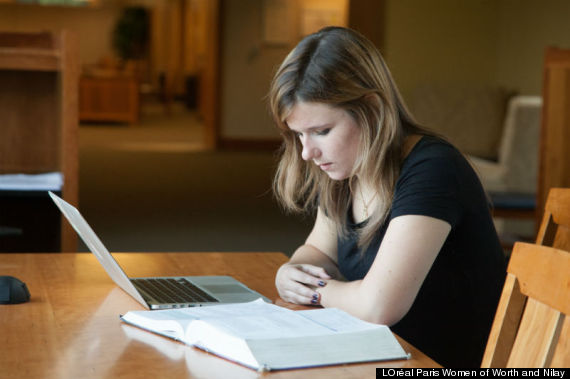When I was in 7th grade, I fell in love with computer science. I was in a class on futuristic thinking and we came across the concept of Artificial Intelligence. I was hooked. That very same day, I went home, bought a coding book and decided that this was what I was going to focus on.
Then, when I was in 10th grade, my cousin was diagnosed with breast cancer and I saw firsthand the effect such a diagnosis can have on a woman and her family. Equipped with the knowledge that 1 in 8 women will be diagnosed with breast cancer in their lifetime and that early detection is crucial, I knew I wanted to get involved and make a difference.

Talking to my cousin, I found out how difficult the diagnostic process was for the patient -- there were expensive tests, biopsies, needles, poking, prodding. I did some research and found out that fine needle aspirates (FNAs) were the least invasive, quickest and cheapest diagnostic procedures. However, because they are inconclusive, most doctors refuse to use them. After some more digging, I learned that the reason they are inconclusive is that the patterns are extremely difficult for pathologists to diagnose. I decided to look for a way to use my passion for artificial intelligence to come up with a tool to aid doctors and the idea for Cloud4Cancer was born.
Cloud4Cancer is a computer program that diagnoses breast cancer by using artificial intelligence to read and interpret data about cancer cells collected through fine needle aspiration, a procedure that causes the patient about the same level of pain as a blood test.
The program will look for patterns and try to determine whether a person has cancer or not. To date, 7.6 million trials have gone through the program and it diagnoses with 99% accuracy. In addition, the program has been extended to work with genetic expression profiling data for leukemia diagnostics and drug target recognition.
Seeing the potential that this program has is why I love science and why I believe that science is how we can revolutionize the world. Through science you can ask questions that have never been asked before and come up with experiments that seek to find answers for those questions. And the cycle is endless - the more questions you pose, the more experiments you need and the more answers you find. How exciting is that?
As a scientist, I know what it is like to fail; to have an idea that doesn't amount to anything. But, because I'm a scientist, I know never to give up. Just because something doesn't work the first time doesn't mean it will never work. It means that you have to reassess, reexamine and try again. Cloud4Cancer failed two times before it succeeded, but from those two times it failed I learned so much on how to improve it to the point that it eventually would work.
I am a true believer in finding a passion and pursuing it; in finding that concept that sparks your interest and learning everything you can about it. My interest in artificial intelligence started as an after-school hobby designing a program that learned to play soccer and has developed into a passion for coming up with ways to advance medical science.
I have been lucky to have so many strong female role models who have supported me in the pursuit of my passion. Being a female in the STEM field isn't easy as we only represent 24% of the workforce. However, throughout my life I have been fortunate to have strong mentors, both male and female, who have empowered me to pursue science, including my high school computer science and biology teachers. I know that this isn't always the case, so in addition to pursuing my own passion of creating programs like Cloud4Cancer, I volunteer with a program created by Google called "Made with Code" aimed at showing young women and girls what they can do with coding.
When you find something you love, whether its science, writing or giving back, make sure you follow it for as far as it will take you and be persistent. Make sure you stick through even the hardest challenges because if you do, the opportunities are endless.
This post was brought to you by L'Oréal Paris Women of Worth, an initiative started in 2005 that honors 10 amazing volunteers combatting disease, poverty, sex trafficking and addiction with $10,000 grants each year. Go to WomenofWorth.com to read their stories.